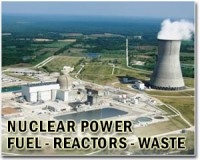 |
Murmansk, Russia (AFP) Oct 17, 2010 An electronic sign along a busy street posts the outside temperature, the wind strength -- and the radioactivity level. Welcome to Russia's Kola Peninsula, a region that still bears the scars of its dubious past as the Soviet Union's "nuclear dump". When the USSR imploded, the northwestern Russian peninsula was left with ageing nuclear submarines and spent nuclear fuel abandoned in not always airtight containers. The Soviet breakdown posed a significant threat to the nearby fish-filled Barents Sea, as well as flourishing opportunities for traffickers of nuclear materials. Two decades and just as many billion dollars later, the "dump" looks a bit less shabby, thanks to funds supplied mostly by the West. "What is positive, or should I say, least negative, is that the situation is under control when it comes to nuclear safety," said Sergei Zhavoronkin of the region's public council for the safe use of nuclear energy. "It has not always been the case." A common practice until the mid-1980s, dumping radioactive waste into the sea is a thing of the past, and the 100 or so submarines once rusting around the peninsula have now almost all been disposed of. The coastline's lighthouses -- isolated, unoccupied and therefore vulnerable to theft -- have gone from using radioisotope thermoelectric generators, which run on radioactive decay and are widely considered unsafe, to solar power. "The situation has changed for the better, but from our point of view, there are still problems," said former submarine officer Aleksander Nikitin. Nikitin was arrested by the FSB security agency -- the KGB's successor -- in 1996 for blowing the whistle on the environmental hazards caused by submarines, making the devastation public through Norwegian environmental group Bellona, for whom he works today. At the top of his list is a facility at Andreeva Bay, some 40 kilometres (24 miles) from the Norwegian border, which holds 30 tonnes of radioactive waste and spent fuel from nuclear submarines and icebreakers. Right next to the Baltic Sea, it stocks some 21,000 nuclear fuel rods -- small fuel tubes -- placed in tanks and dubious containers. Together the rods account for some 850,000 terabecquerel, which is nine times the amount of radioactivity released by the nuclear accident at Chernobyl in 1986. "They are the same (nuclear fuel rod-filled) tanks as in the 1980s. They have only built a roof over them to protect them from the rain and a fence to keep undesirable visitors away," said Igor Koudrik, another Bellona researcher. According to Valery Panteleyev, who leads public authority SevRao that is in charge of cleaning up the peninsula, a first batch of containers filled with fuel rods was shipped to the Mayak waste treatment plant in the Urals in June. "That is the easy part," said Koudrik, adding that while authorities may be able to move the containers, they "still don't know how to empty the tanks." Another problem is a support vessel for icebreakers that has been sitting in Murmansk for 20 years waiting for a way to be found for its load of often broken radioactive fuel tubes to be extracted and disposed of. The floating wreck, Lepse, was built in 1936 and is threatening to sink. Although Russian authorities pledged transparency about the region's nuclear issues, foreign journalists are denied access to a number of sites. In Murmansk, meanwhile, the radio still informs listeners to the weather updates of the level of radioactivity, and at the Russian-Norwegian border vehicles are scanned to detect any illegal exit of nuclear material.
Share This Article With Planet Earth
Related Links Nuclear Power News - Nuclear Science, Nuclear Technology Powering The World in the 21st Century at Energy-Daily.com
 US watching 'closely' Venezuela-Russia nuclear deal
US watching 'closely' Venezuela-Russia nuclear dealWashington (AFP) Oct 15, 2010 The United States said Friday it was keeping a close eye on a deal under which Russia will build and operate Venezuela's first nuclear power station. "This is something that we will watch... very, very closely," State Department spokesman Philip Crowley told reporters. "It is certainly a right of any country to pursue civilian nuclear energy, but with that right comes responsibilities," ... read more |
|
| The content herein, unless otherwise known to be public domain, are Copyright 1995-2010 - SpaceDaily. AFP and UPI Wire Stories are copyright Agence France-Presse and United Press International. ESA Portal Reports are copyright European Space Agency. All NASA sourced material is public domain. Additional copyrights may apply in whole or part to other bona fide parties. Advertising does not imply endorsement,agreement or approval of any opinions, statements or information provided by SpaceDaily on any Web page published or hosted by SpaceDaily. Privacy Statement |